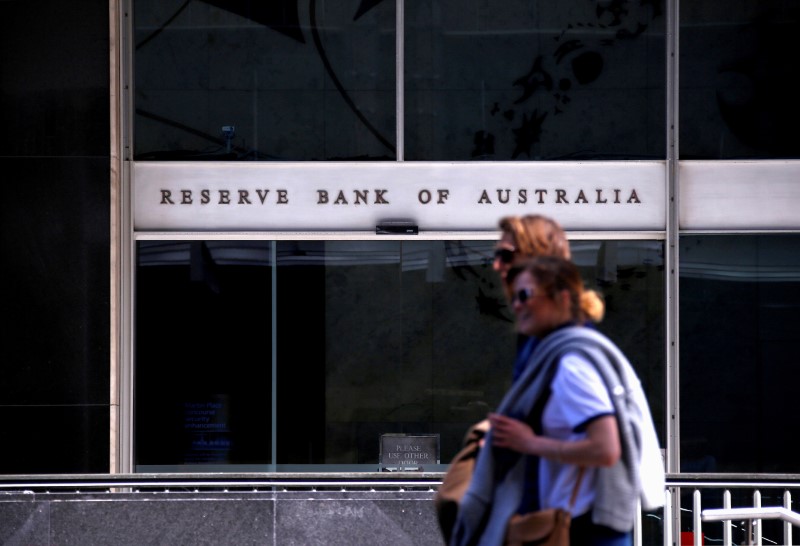By Balazs Koranyi, Howard Schneider and Leika Kihara
FRANKFURT (Reuters) - The world's biggest central banks will happily live with higher inflation and investors now aggressively betting on a quicker end to monetary stimulus are all but certain to be proved wrong.
After a decade of underestimating inflation, central bankers in the United States, Europe and Japan have every reason keep money taps open and policymakers are even rewriting their own rules so they can let price growth overshoot their targets.
If anything, central banks are more likely to nudge up stimulus, particularly in the euro zone, keeping borrowing costs depressed and ignoring the inflation hawks at least until growth is back to pre-pandemic levels -- and not just fleetingly.
The Reserve Bank of Australia already launched a surprise bond buying operation while the European Central Bank has repeatedly warned investors not to push yields too high, unless they want to fight its 1 trillion euro war chest.
The argument behind the inflation warning is that once economies reopen, massive government stimulus will combine with pent up consumer demand, unleashing spending-fuelled price pressures unseen for decades.
Although top economists are weighing in on both sides of the debate, the voices that really count all seem to be downplaying the threat.
"Inflation dynamics do change over time but they don't change on a dime," Federal Reserve Chair Jerome Powell said.
"We don't really see how a burst of fiscal support or spending ... that doesn't last for many years, would actually change those inflation dynamics."
Even if inflation accelerates, a big if given that big central banks are all undershooting their 2% goal, tightening policy too hastily is seen as a bigger evil than moving too slowly.
First off, much of the inflation rise is temporary, driven by the rebound in oil, one-off stimulus measures and the base effect of tanking prices a year ago. So this is not the sort of sustained inflation policymakers are looking for.
Tighter policy could also choke off growth - a costly blunder with tens of millions still out of work after the biggest peacetime economic crisis in a century. In the worst case, higher borrowing costs would even raise debt sustainability concerns, particularly in heavily indebted southern Europe and across emerging markets.
And lastly, the Fed and European Central Bank both tightened policy too quickly in the past decade, forcing them into the type of credibility-damaging reversal they are now keen to avoid.
JOBS
The message from the Fed has been uniform and emphatic: its $120 billion monthly bond purchases will not change until the economy has more fully recovered, and any actual interest rate increase is even further into the future.
The Bank of Japan and the ECB are making similar noises: there will be no reversal of stimulus for a long time, possibly years.
Their central concern is employment.
There is still a 10-million-job hole in the U.S. economy while the euro zone unemployment rate is kept artificially low by government subsidies, pointing to huge spare capacity.
The Fed is already putting greater emphasis on job creation, particularly for low income families, and made an explicit commitment last year to let inflation overshoot its target after periods of excessively low price growth.
While the ECB and the Bank of Japan do not have employment mandates, policy framework reviews now underway could raise the emphasis on social considerations, particularly jobs.
The ECB is already debating the merits of letting inflation overshoot, a hint that overheating in the jobs market will not on its own trigger policy action.
"Labour markets tend to lag real activity by as much as six months, and we may yet see a wave of mergers, bankruptcies, and layoffs," said Tamara Basic Vasiljev of Oxford Economics.
BIG MOVE?
While the rise in yields has caused a ruckus in markets, the moves are not excessive and may simply be a reversal of excessively low yields.
U.S. 10-year Treasury yields are up 56 basis points this year - to roughly their pre-pandemic record low - while Japanese yields are just 14 basis points higher. A 10-year German bond still yields a negative 25 basis points.
"We see a return of bond yields from ultra-low to still low levels as a consequence of, rather than an obstacle to, a strong economic rebound and solid gains in corporate earnings in most of the world," Berenberg economist Holger Schmieding said.
Policymakers have also played down the moves.
Atlanta Fed President Raphael Bostic argued that the increase in yields was of no concern and did not warrant any Fed response.
ECB policymakers have meanwhile said some rise in yields was a reflection of better fundamentals and they would not target any yield level.
"I don't think the BOJ is too worried about the recent rise in yields," Tomoyuki Shimoda, a former BOJ executive and Hitotsubashi University professor said. "The BOJ has plenty of scope to ramp up buying as needed. It can stem unwelcome yield rises 100%."
